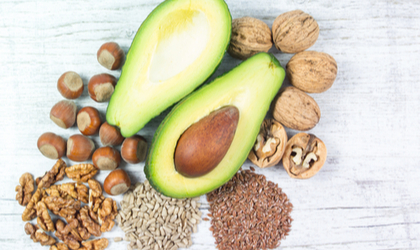
A staple of the Mediterranean diet, oily fish has long been celebrated as a health food. The long-chain omega-3 fatty chain omega-3 fatty acids, EPA (eicosapentaenoic acid) and DHA (docosahexaenoic acid), are responsible for giving oily fish its revered reputation in the nutritional world.
To safeguard health, The World Health Organisation (The WHO) recommends eating two to three portions of oily fish a week. You can also take a high-quality fish oil supplement – or plant-based alternative –, which acts as an excellent insurance policy to cover any dietary shortfalls.
DHA and EPA support different areas of health. DHA and EPA contribute to the normal function of the heart* and to the maintenance of normal blood pressure.** DHA, on the other hand, contributes to the maintenance of normal vision*** and, crucially, brain function,*** as we explore below.
What is DHA?
Found abundantly in oily fish, DHA is a long-chain polyunsaturated omega-3 fatty acid. This compound is a vital component of all cell membranes in the body and a primary structural component of the retina and the brain (1). Remarkably, DHA accounts for 97 per cent of omega-3s in the brain.
DHA is an essential fatty acid, which means it isn’t produced naturally in the body but critical for health. As such, you have to obtain DHA from dietary sources or nutritional supplements.
What does DHA do for the brain?
Aside from contributing to the maintenance of normal brain function, DHA is also essential for the growth and functional development of the brain in infancy (2). Study after study, DHA has shown great promise in supporting overall brain and cognitive health as we age (3).
How much DHA is needed for brain health?
To maintain normal brain function, you would need an intake of at least 250mg of DHA each day.*** If you don’t eat two to three portions of oily fish a week, we highly recommend taking a high-strength EPA and DHA supplement to satisfy this nutritional need.
What’s the difference between DHA and EPA?
DHA and EPA are often broadly spoken about together. In reality, the two play many different roles in the body. EPA can do a lot of things DHA can’t. And visa versa. That’s why you need them both.
DHA is more involved in brain and vision function, while EPA is associated with cardiovascular health.
What are other sources of DHA?
Beyond seafood and oily fish – salmon, herring, sardines, and trout, to name a few – you can also find DHA in microalgae. Ingeniously, these tiny plant organisms are where fish get their omega-3 fatty acids, effectively cutting out the middleman (or fish!).
Microalgae is a brilliant plant-based DHA supplement alternative for vegans and vegetarians. The best way to add microalgae to your diet is through supplementation. You can find out more about our high-strength VEG Omega-3 formula here.
It’s also worth mentioning that the body converts another omega-3 fatty acid called alpha-linolenic acid (ALA), typically found in plant foods, like flaxseeds, into DHA. However, this conversion process may not be as efficient for some people. In which case, microalgae is an excellent choice to get pre-formed DHA.
Increasing your dietary intake of DHA is one of the best ways to safeguard your overall health, especially when looking after your brain. Taking a quality fish oil formula – or plant-based DHA supplement – is an easy and convenient insurance policy to ensure your DHA levels remain at a healthy level.
Brain health aside, DHA also contributes to the maintenance of normal blood pressure. You can learn more about that here.
For more tips on staying healthy and happy, please visit our dedicated health blog.
* A beneficial effect is obtained with a daily intake of 250mg of DHA and EPA
**A beneficial effect is obtained with a daily intake of 3 grams of DHA and EPA
*** A beneficial effect is obtained with a daily intake of 250mg of DHA
References
- Krauss-Etschmann S, Shadid R, Campoy C, Hoster E, Demmelmair H, Jimenez M, Gil A, Rivero M, Veszpremi B, Decsi T, et al. (2007) Effects of fish-oil and folate supplementation of pregnant women on maternal and fetal plasma concentrations of docosahexaenoic acid and eicosapentaenoic acid: a European randomized multicenter trial. Am J Clin Nutr. 85: 1392–400.
- Horrocks LA, Yeo YK. (1999) Health benefits of docosahexaenoic acid (DHA). Pharmacol Res. 40(3): 211-25.
- Dyall S. C. (2015). Long-chain omega-3 fatty acids and the brain: a review of the independent and shared effects of EPA, DPA and DHA. Frontiers in aging neuroscience, 7, 52; Derbyshire E. (2018). Brain Health across the Lifespan: A Systematic Review on the Role of Omega-3 Fatty Acid Supplements. Nutrients, 10(8), 1094.
Related Posts
Disclaimer: The information presented by Nature's Best is for informational purposes only. It is based on scientific studies (human, animal, or in vitro), clinical experience, or traditional usage as cited in each article. The results reported may not necessarily occur in all individuals. Self-treatment is not recommended for life-threatening conditions that require medical treatment under a doctor's care. For many of the conditions discussed, treatment with prescription or over the counter medication is also available. Consult your doctor, practitioner, and/or pharmacist for any health problem and before using any supplements or before making any changes in prescribed medications.

Keri
Keri Filtness has worked in the Nutrition Industry for 19 years. She is regularly called upon for her professional comments on health and nutrition related news. Her opinions have been featured by BBC3, Prima, Vitality, The Mirror, Woman’s Own and Cycling Weekly, amongst others. She has also worked one to one with journalists, analysing their diets and health concerns and recommending changes and additions, where appropriate.



